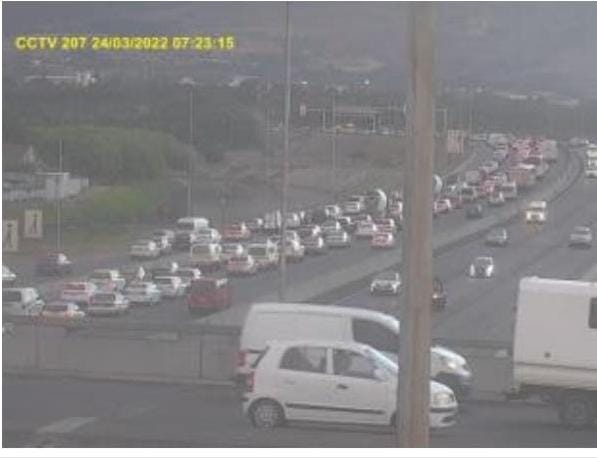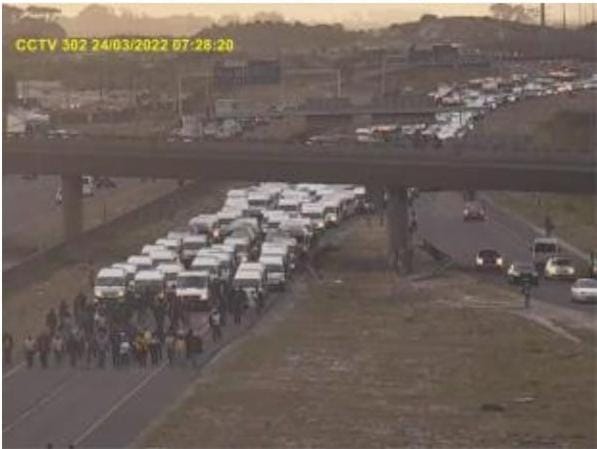The demonstration, organised by two taxi associations, Codeta and Cata, blocked several arterial roads into the city’s central business district on Thursday morning. (Getty Images)
A taxi protest turned violent in Cape Town on Thursday and resulted in the intimidation of and open threats of violence to commuters. Several vehicles were stoned and a bus petrol bombed as a result of the protest, which spread to neighbouring suburbs.
The demonstration was supposed to be a “peaceful” one, and was organised by the Congress of Democratic Taxi Association (Codeta) and Cape Amalgamated Taxi Association (Cata). It was set to culminate in a letter of grievance being handed to Premier Alan Winde.
Codeta spokesperson Lesley Siphukela told the Mail & Guardian the associations had applied for a “peaceful march” three weeks ago, but that permission was granted only this week.
The approved route was from Hanover Street to the provincial legislature in Wale Street, according to the City of Cape Town.
 (Supplied)
(Supplied)
But scores of drivers ignored the course, resulting in large parts of the N2 being brought to a halt as hundreds of taxis blocked the artery into Cape Town’s central business district. Spine Road, the R300 and Borchard’s Quarry were also blocked, but have since reopened.
In the city’s business district roads were closed as protestors on foot, followed by taxis, neared the provincial legislature.
Multiple commuter-filled taxis not affiliated with Cata or Codeta were stoned along Jakes Gerwel Drive. Several taxis belonging to the Bonteheuwel Taxi Association were also stoned. It remains unclear to which taxi association — if any — the stone throwers are affiliated.
A Golden Arrow bus was reportedly also petrol bombed in Nyanga, where similar violence broke out on Friday last week.
Siphukela said the association was unaware of any violence having taken place on Thursday.
The chairperson of the South African National Taxi Council (Santaco), Nazeem Abdurahman, told the M&G that Santaco was not part of Thursday’s protest.
“We know [Cata and Codeta] have concerns,” said Abdurahman, but these should be raised in a law-abiding manner instead of “what is currently happening”.
In their letter of grievance, the associations demand that Cape Town’s law enforcement officers not impound their vehicles pending renewal or replacement of operating licences because it “has [a] negative impact on our livelihood”.
 (Supplied)
(Supplied)
The associations also want the city to change bylaws “as a matter of urgency”, particularly traffic bylaws that allow officers to impound a taxi that is operated in contravention of its approved licence or route. The associations say the bylaws do not gel with national legislation.
Cata and Codeta also claim the provincial government approved operating licences for Golden Arrow, but withheld permits for the taxi industry.
“We view this as the practice of apartheid government, where favours were provided to certain groups and left other groups crying and bleeding,” according to the letter of demands.
The associations also urged the Western Cape MEC for transport and public works, Daylin Mitchell, to review the validity of operating licences, which currently run for seven years.
“We demand indefinite permits. We also demand the PRE [Provincial Regulatory Entity] grant us an operating licence; when you buy a new vehicle, for example, an automatic licence should be given to you.”
In response to the violence, Mitchell warned that he would use “all regulatory and legislative mechanisms” to deal with the incidents by suspending or withdrawing operating licences.
“I will not stand by and allow a handful of opportunists to hold the commuters
of this province hostage. I have said it before and I maintain that illegal and criminal acts will not be tolerated,” Mitchell said.